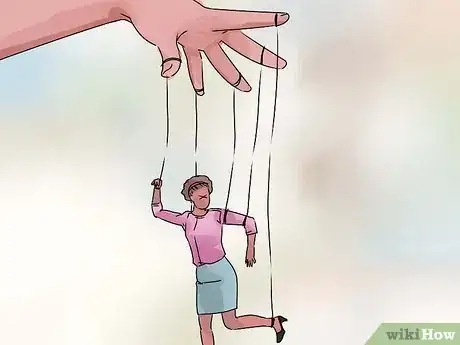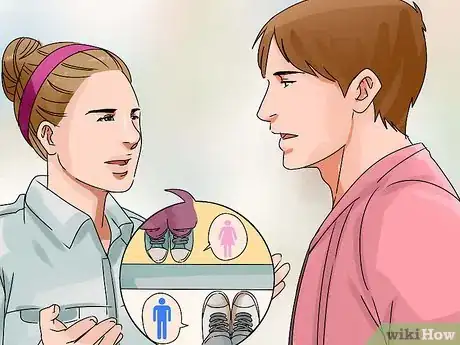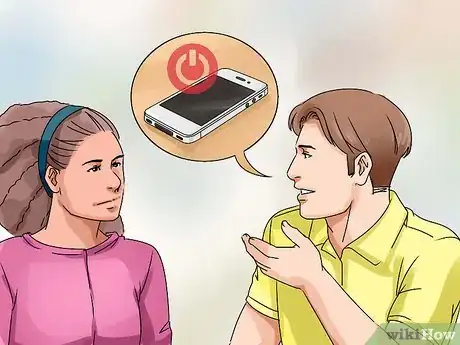This article was co-authored by Erika Kaplan. Erika Kaplan is a Dating Coach and Matchmaker for Three Day Rule, an exclusive matchmaking company across nine cities in the United States. With over six years of experience, Erika specializes in helping singles find quality matches through date coaching and premium matchmaking services. Erika graduated from Penn State with a Bachelor’s degree in Public Relations. She worked for Rolling Stone, Us Weekly, and Men’s Journal before leaving publishing to pursue her passion for connecting people. Erika has been featured on Lifetime, the Philadelphia Inquirer, and CBS as well as in Thrillist, Elite Daily, Men’s Health, Fast Company, and Refinery29.
There are 10 references cited in this article, which can be found at the bottom of the page.
This article has been viewed 109,240 times.
Of course you care about your girlfriend or boyfriend, but you may want more space than she or is willing to give you. Perhaps he or she always calls you whenever they find him or herself in a time of need (which may be daily) or is constantly requesting your time, energy, or money. This is an especially difficult issue to bring up because you may be scared of hurting your partner’s feelings that you want more alone time. Finding a balance between spending time together and having your space can be difficult, but it is possible.
Steps
Working Through Clingy Behaviors and Motivations
-
1Understand what makes people cling. Often, partners cling when they fear that the person they care about is about to leave.[1] You may subtly be spending less time together, texting or calling less often, or not be sending the same reassurance that you had previously. The fear of abandonment can kick in. While it’s not your role to provide assurance, you can understand the behaviors and motivations behind clinging.
- This anxious type of attachment style might not have anything to do with you at all—it could be a result of childhood experiences or previous relationships.[2]
- If your partner starts to worry about you leaving, remind him or her while neither of you can predict the future, you are both happy now, and now is where the focus is best placed.
-
2Reflect on your own history. Sometimes you choose people whom you share a great attraction, yet trigger your deepest insecurities. This can be true of your partner, too. Without you realizing it, you can trigger insecurities in your partner that have never been explored before.[3] Realize that this may mean one person wants to pull closer or wants to pull away. While it’s tempting to run, it can also be worth it to stick with it and work through the issues.
- Perhaps you’ve had clingy people in your life before (like a younger sibling or an ex) and your current partner’s behavior is triggering those memories, causing you to want to run. Before you go blaming your partner, take a few moments to reflect on your own life.
- Have there been previous relationships when you’ve clung? What made you cling, and how did the other person respond to your behavior?
- What is it about the clinginess that upsets you, and how do you respond to it? Do you respond in anger, frustration, or distancing yourself?
Advertisement -
3Navigate manipulation. There’s a distinction between neediness and manipulation. Manipulation often involves you giving up something for the other person.[4] A manipulator may use weaknesses against you, blame you for things, or suggest that only you can help him or her. Especially if you tend to be a genuinely helpful person, be careful not to be taken advantage of by your partner. Ask yourself whether your partner’s actions or needy or if they are manipulative.
- Manipulation can be punishing you when your partner doesn’t get his or her way (giving the silent treatment, not performing household chores), or as extreme as threatening to hurt the self if you don’t do what he or she wants. If you find yourself feeling punished when you don’t comply with your partner’s demands or neediness, it may be manipulation.
- If you feel like you are being manipulated, be careful in how you interact with your partner, especially when talking about offering help, money, or giving up something.
- For more information, check out How to Pick Up on Manipulative Behavior, How to Recognize a Manipulative or Controlling Relationship, and How to Deal With a Manipulative Person.
-
4Be patient with your partner. Your partner can't necessarily help he or she feels clingy. Remind yourself of all the things that make your partner great and that make the relationship great. Be patient and empathetic toward your partner for why he or she feels this way. Perhaps your partner has felt abandoned in the past or there are things you don’t fully understand about him or her.
- When you feel angry or frustrated, remind yourself to be patient, loving, and gentle toward your partner and his or her emotions.
- Be especially sure to show up for your partner when you say you will—that will help reinforce that your partner can trust you.[5]
-
5Use imagery related to a healthy relationship. If you tend to run away, imagine yourself in a secure, equally balanced relationship. If your partner tends to cling, have him or her imagine the self in an equally balanced relationship. Even imagining a safe, healthy relationship can be helpful, especially when under stress.[6]
- Set aside some time with your partner for this exercise. Close your eyes and imagine what a healthy relationship looks like to you (and your partner). Imagine feeling calm, centered, and happy at the thought of this relationship. What does it feel like? What do the two of you do together, and not do together? Then, shift your attention and imagine that that is the relationship you have. When you are finished, open your eyes and discuss.
-
6Evaluate if you’re in a codependent relationship. Often there’s something about the relationship that’s beneficial to both people and not just one person. So, if you have a partner that you perceive as clingy, is it possible that somehow you benefit from or play into the clinginess? Some signs of codependent relationships include an inability to find happiness outside of one person, staying with someone even though your partner has some unhealthy or destructive behaviors (like drug abuse or alcoholism).[7]
- Do you find yourself giving to your partner (emotionally, physically, financially) even at the cost of your own health or well-being?[8]
- Ask yourself if you give up your own needs to fulfill the needs of your partner. This can lead to short-term and long-term consequences.[9]
- Ask yourself whether you are genuinely happy with your partner or if you stay with him or her based on what you’d lose if you broke up.
-
7Flow with the relationship. Remember there will be times that you will be needy and times when your partner will distance from you.[10] This is the normal flow of relationships. When you care about someone, you choose to love and support him or her during the ebbs and flows, even when it influences your life. Remind yourself that circumstances and situations can always change, and that relationships are fluid.
- Is your partner being clingy because of a situation or life event? If so, you may need to give your partner a momentary break and focus on being supportive. There will be times you will need extra support, too.
Discussing the Issue with Your Partner
-
1Think about what is bothering you. While it may seem simple, think about what it is that really bothers you. Are there specific situations when your partner feels clingy? Are there any factors you bring in, such as you get upset with the clinginess when you’re tired, stressed, or frustrated? What thoughts and feelings come up when you think about your partner being clingy?
- Do you tend to run from relationships when they become serious? Or have you been the clingy partner in the past? Reflect on your own dating history and think if this has anything to do with how you feel.
- Try to look at things from your partner’s perspective. He or she might be afraid of losing you or may feel depressed.
- You may want to write down what bothers you, when, and why so you can better understand how to express yourself.
-
2Discuss how you feel with your partner. It’s not fair to you or your partner to hold these feelings in and keep them to yourself. Have a talk with your girlfriend or your boyfriend and let him or her know that you feel overwhelmed. Your partner may not know the way you feel and unintentionally smother you, and by you holding in your feelings, you may begin to resent your partner.[11] Plan to have a talk with your partner and gently let him or her know what bothers you. It can be difficult to have these conversations, but remember that it’s important to communicate your feelings to your partner.
- Don’t accuse your partner of being clingy. Be gentle in your approach, saying, “It’s important to spend time with you, and yet it’s also important for us to have our separate lives and interests, too.”
- Say, “I feel a healthy relationship includes spending quality time together, and also time apart. It’s important to me to keep my interests and friends while still being in a fulfilling relationship with you.”
- Instead of only expressing your concerns, try to think of some actionable steps you can bring up in order to offer some solutions, which can be found in the next section.
-
3State your feelings and concerns. You may feel like pinning the problem all onto your partner, saying “You make me feel….” or “I hate it when you…” Avoid this trap, which may lead to hurt feelings or escalation of blame. Instead of potentially placing blame or accusation onto your partner, state the way you feel.
- You can start by saying, “There are times I feel overwhelmed by how much time we spend together.”
- Say, “My concern is…” to state the source of the feeling.[12] For instance, say, “When you want to spend all your time with me, I feel overwhelmed. My concern is that we will get so wrapped up in each other that the rest of life will slip away.”
-
4Agree to set some boundaries. After you discuss how you feel, set some healthy boundaries with your partner. Try to find a happy medium that will give you the space you need while still helping your partner feel secure and loved.[13]
- For instance, you might say, “I love receiving texts from you throughout the day and knowing you are thinking about me. Sometimes I can feel a little overwhelmed, though. Can we cut back on texting while I’m at work?”
- Keep boundaries healthy. You don’t want to be controlling or feel controlled by your partner. Ideally, boundaries should benefit both partners by giving you some space and allowing your partner to not rely heavily on you or your support.
- If your partner calls you for help constantly, you can set a boundary, as this can burn you out.[14] While it’s not a bad thing to offer help, it can deplete you. Discuss with your partner ways he or she can help herself, call other people, or work through difficult situations without relying on you.
- Remember that boundaries help to create a healthy sense of self, they aren’t there to push your partner away.
-
5Enforce the boundaries you set. While it’s fine to set boundaries, the real test comes in enforcing them. Especially when you set in a new system, your partner may feel like you are abandoning him or her, and make more effort to contact you or be with you. When you set boundaries, also discuss ways to enforce the boundaries. You may need to turn your phone on silent or off completely, or say “no” more often. Remind yourself and your partner that you set these boundaries to help you, and that they need to stay.
- Of course, it’s okay to re-negotiate boundaries once they are no longer serving you.
Spending Time Apart
-
1Participate in your own hobbies. If you find that you and your partner spend all of your time together by default, find ways to enjoy activities on your own.[15] Maybe you are interested in learning to sew but have never gotten around to it, or your partner wants to learn to dance. This is a great opportunity to explore your own interests without feeling like you need to be around your partner.
- Having your own hobbies helps you and your partner make friends independently while doing activities that you enjoy.
- Some hobbies you may want to check out include hiking, snow shoeing, knitting, painting, or reading.
-
2Spend time with your own friends. Sometimes love can sweep you off your feet, and then several months later you may realize you no longer spend time with your friends and family. It’s important for your mental and emotional health to surround yourself with friends and have friends in your life.[16] If you’ve cut out your friends from your life, invite them back in.
- Organize a guys’ night or a girls’ night to spend with just your friends. Plan a weekend getaway or a movie night.
-
3Exercise. Joining a gym or a sports team is a great way to blow off steam, challenge your mind and body, and sweat a little bit. Exercise is good for mental, emotional, and physical health, and should be performed 30 minutes or more, several times each week.[17]
- Many gyms offer classes. If you’re interested in weight training, yoga, pilates, or other group fitness classes, check out your local gym and see what they offer.
-
4Challenge yourself. Start an endeavor that you’ve never done that’s currently out of your reach. Having a goal and working toward it can be motivating, exciting, and challenging. Perhaps you want to run a marathon or complete a difficult craft project. Find a goal that excites you, and go do it.
- Go hike Mount Whitney or do a week-long backpacking trip. Teach your dog how to do complicated tricks. Bike 100 miles in one day. The possibilities are endless!
Expert Q&A
Did you know you can get expert answers for this article?
Unlock expert answers by supporting wikiHow
-
QuestionHow can I deal with a clingy girlfriend?
 Erika KaplanErika Kaplan is a Dating Coach and Matchmaker for Three Day Rule, an exclusive matchmaking company across nine cities in the United States. With over six years of experience, Erika specializes in helping singles find quality matches through date coaching and premium matchmaking services. Erika graduated from Penn State with a Bachelor’s degree in Public Relations. She worked for Rolling Stone, Us Weekly, and Men’s Journal before leaving publishing to pursue her passion for connecting people. Erika has been featured on Lifetime, the Philadelphia Inquirer, and CBS as well as in Thrillist, Elite Daily, Men’s Health, Fast Company, and Refinery29.
Erika KaplanErika Kaplan is a Dating Coach and Matchmaker for Three Day Rule, an exclusive matchmaking company across nine cities in the United States. With over six years of experience, Erika specializes in helping singles find quality matches through date coaching and premium matchmaking services. Erika graduated from Penn State with a Bachelor’s degree in Public Relations. She worked for Rolling Stone, Us Weekly, and Men’s Journal before leaving publishing to pursue her passion for connecting people. Erika has been featured on Lifetime, the Philadelphia Inquirer, and CBS as well as in Thrillist, Elite Daily, Men’s Health, Fast Company, and Refinery29.
Matchmaker
References
- ↑ https://www.psychologytoday.com/blog/fulfillment-any-age/201209/why-clingy-partners-cling
- ↑ Erika Kaplan. Matchmaker. Expert Interview. 1 October 2020.
- ↑ https://www.psychologytoday.com/blog/the-intelligent-divorce/201305/how-fix-clingy-relationship
- ↑ https://www.psychologytoday.com/blog/communication-success/201406/how-spot-and-stop-manipulators
- ↑ Erika Kaplan. Matchmaker. Expert Interview. 1 October 2020.
- ↑ https://www.psychologytoday.com/blog/tech-support/201503/are-you-too-clingy-is-your-partner
- ↑ http://www.webmd.com/sex-relationships/features/signs-of-a-codependent-relationship
- ↑ http://www.webmd.com/sex-relationships/features/signs-of-a-codependent-relationship
- ↑ http://www.webmd.com/sex-relationships/features/signs-of-a-codependent-relationship?page=2
- ↑ https://www.psychologytoday.com/blog/the-intelligent-divorce/201305/how-fix-clingy-relationship
- ↑ https://www.psychologytoday.com/blog/resolution-not-conflict/201305/how-express-feelings-and-how-not
- ↑ https://www.psychologytoday.com/blog/resolution-not-conflict/201305/how-express-feelings-and-how-not
- ↑ Erika Kaplan. Matchmaker. Expert Interview. 1 October 2020.
- ↑ https://www.psychologytoday.com/blog/presence-mind/201508/4-ways-set-boundaries
- ↑ http://www.webmd.com/sex-relationships/features/signs-of-a-codependent-relationship?page=2
- ↑ http://www.helpguide.org/articles/stress/stress-management.htm
- ↑ http://www.helpguide.org/articles/stress/stress-management.htm
About This Article
If your girlfriend's or boyfriend’s clingy behavior is stressing you out, take time to assess your relationship and figure out what’s causing it. For example, maybe they’re feeling insecure because you’ve been spending less time together lately. Don’t make assumptions, though—ask questions about what they’re thinking and feeling to prevent any misunderstandings. Let them know how their behavior makes you feel, and work together to create boundaries and ground rules. For more tips from our Relationships co-author, including how to get healthy distance in your relationship, read on!











































































